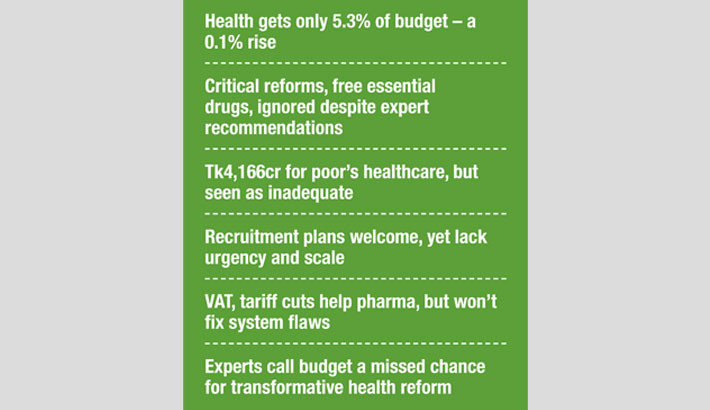Health left off the priority list – again
Moudud Ahmmed Sujan, Dhaka
Published: 03 Jun 2025

The health sector has received an allocation of Tk41,908 crore – or 5.3% of the Tk7.90 lakh crore national budget – proposed by Finance Adviser Salehuddin Ahmed during a televised speech on Monday.
This represents a marginal increase of just 0.1% compared to last year’s revised allocation of Tk41,407 crore, once again leaving health off the list of top government priorities.
Dr Salehuddin said the government has proposed an additional Tk4,166 crore to provide free healthcare for the poor, along with Tk1,000 crore to expand the national immunisation programme.
He also announced plans to accelerate the recruitment of doctors, nurses, technicians, pharmacists, and health assistants, and said a coordinated strategy to create new positions was underway.
However, public health experts remain unconvinced.
Professor Shafiun Shimul of the Department of Health Economics at the University of Dhaka said, “Even though some proposals – such as allocating Tk4,200 crore for marginalised people and expediting recruitment of vital staff – are welcome, these changes are far less than what we expected.”
He added that the Health Reform Commission had proposed critical steps, such as providing all essential medicines free of cost and ensuring full coverage for non-communicable diseases like cancer, diabetes, and kidney failure. “It appears that none of these have been addressed. It’s disappointing to see such vital priorities ignored at a time when real change was both possible and necessary,” he added.
Professor Shimul said, “The health sector is in distress, and this budget was a missed opportunity to initiate meaningful reform. In the aftermath of the July mass uprising, there was hope for bold, people-centred measures – but what we got is a conventional budget, lacking both urgency and vision.”
Professor Syed Abdul Hamid of the Institute of Health Economics at the University of Dhaka pointed out that last year, the health ministry saw its allocation slashed by Tk14,000 crore – down to Tk27,925 crore.
“Even then, the ministry couldn’t spend Tk8,000 crore of that,” he said. “My recommendation is simple: don’t cut a single taka from health this year. Identify the reasons behind poor spending and address them from 1 July. If that’s done, we can demand a 5–6 percent increase next year.”
The budget does offer a range of tax exemptions and policy measures aimed at improving healthcare delivery and local production. All VAT has been waived until June 2030 on the import and domestic purchase of components used in manufacturing hospital beds.
The same extension applies to VAT exemptions on the production of Active Pharmaceutical Ingredients (APIs), as well as on general and ICU ambulances and hybrid or electric vehicles used in the health sector.
To ensure uninterrupted treatment of critical illnesses, the government has proposed extending duty exemptions on the import of raw materials for the pharmaceutical industry, including cancer drugs and inputs for API production. Additionally, the budget suggests reducing tariffs on medical equipment for referral hospitals and facilities with more than 50 beds to improve access to advanced treatment.
The adviser also outlined plans to build an international-standard training centre for nursing instructors and to launch a PhD programme in nursing education. He highlighted the potential of the caregiver sector to boost overseas employment and remittance earnings, noting that the government will invest in skill development to meet global standards.
While the budget includes structural steps in some areas, experts argue that these are piecemeal moves in a sector that demands urgent and strategic overhaul. As Bangladesh moves closer to becoming an ageing and urbanised society, they say healthcare deserves not just attention, but transformation – beginning with serious investment.
But for now, health remains just another item on the ledger, not a cornerstone of national development. And once again, it appears that the nation's most basic needs have been sidelined in the name of fiscal balance.

